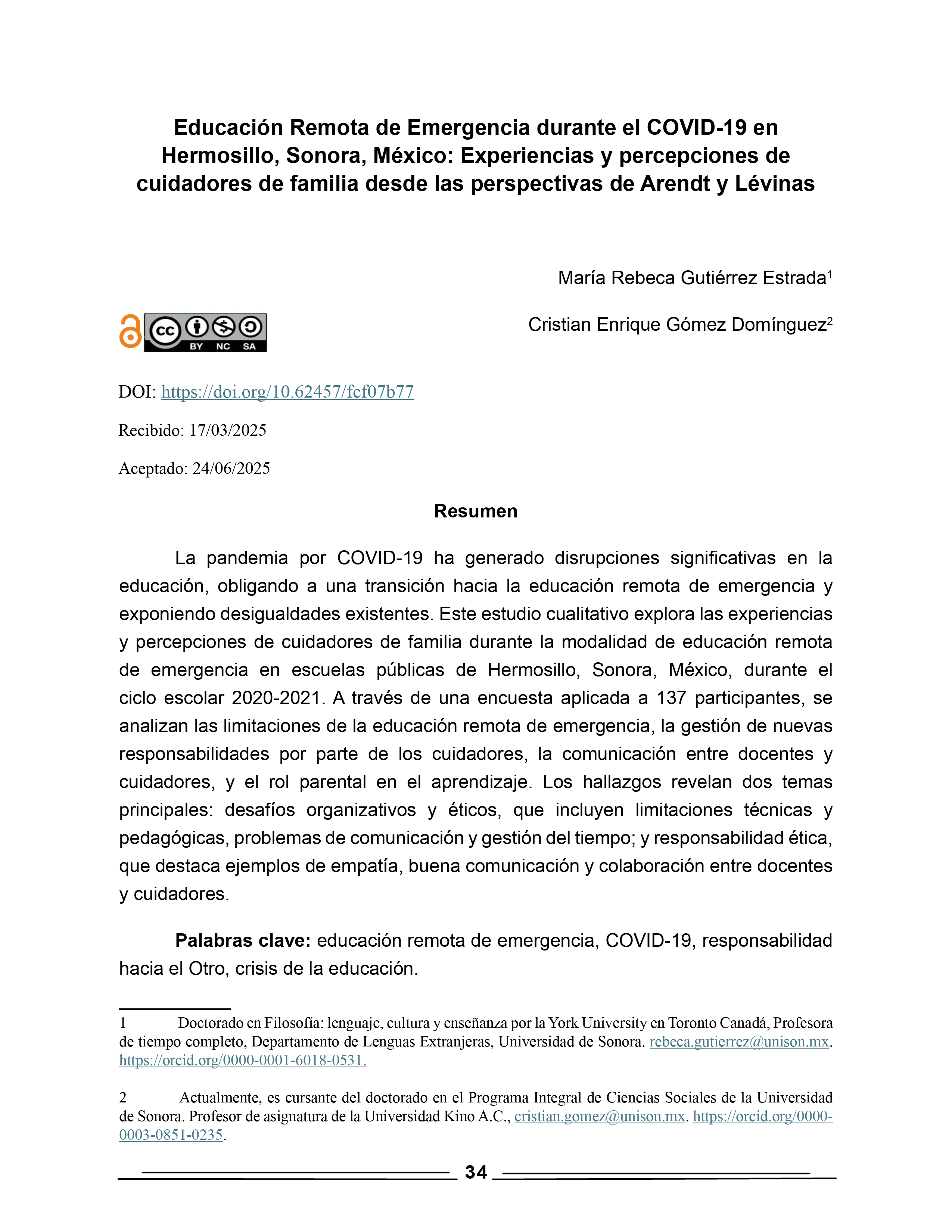Emergency remote teaching during COVID-19 in Hermosillo, Sonora, Mexico: Caregivers' experiences and perceptions from the perspective of Arendt and Lévinas
DOI:
https://doi.org/10.62457/fcf07b77Keywords:
emergency remote education, COVID-19, responsibility towards the Other, educational crisisAbstract
The COVID-19 pandemic caused a significant disruption to education, forcing a transition to emergency remote education and exposing existing inequalities. This qualitative study explores caregivers' experiences and perceptions during the emergency remote education modality in public schools inem Hermosillo, Sonora, Mexico during the 2020-2021 school year. Through a survey administered to 137 participants, the limitations of emergency remote education, caregivers coping with the new tasks, communication between teachers and caregivers, and caregivers' role in learning are analyzed. The results reveal two main themes: Organizational and ethical challenges, which include technical and pedagogical limitations, communication issues, and time management, and ethical responsibility, which highlights examples of empathy, good communication, and collaboration between teachers and caregivers.
Downloads
References
Arendt, H. (1996). Entre el pasado y el futuro: Ocho ejercicios sobre la reflexión política. Ediciones Península.
Arendt, H. (2003). La condición humana (R. Gil Novales, Trad.). Paidós. (Orinal publicado en 1958).
Ball, H. L. (2019). Conducting online surveys. Journal of Human Lactation, 35(3), 413-417. https://doi.org/10.1177/0890334419848734
Baptista, P., Loeza, C., Almazán, A., López, V., & Cárdenas J. (2020). Encuesta nacional a docentes ante el Covid-19. Retos para la educación a distancia. RLEE NUEVA ÉPOCA. V. L Special Number. https://rlee.ibero.mx/index.php/rlee/article/view/96/369
Berenpas, M. (2021). On facing one's students: The relevance of Emmanuel Lévinas to teaching in times of Covid-19. Journal of Philosophy of Education, 55(4-5), 649-664.
Braun, V., & Clarke, V. (2006). Using thematic analysis in psychology. Qualitative Research in Psychology, 3(2), 77-101. https://doi.org/10.1191/1478088706qp063oa
De Assis César, M. R. (2007). Hannah Arendt y la crisis en la educación en el mundo contemporáneo. En-claves del pensamiento, 2, 7-22. emergente durante la pandemia por COVID-19 en México (Tesis de maestría).
Etikan, I., Musa, S. A., & Alkassim, R. S. (2016). Comparison of Convenience Sampling and Purposive Sampling. American Journal of Theoretical and Applied Statistics, 5, 1-4. https://doi.org/10.11648/j.ajtas.20160501.11
Ferri, F., Grifoni, P., & Guzzo T. (2020). Online learning and emergency remote teaching: Opportunities and challenges in emergency situations. Societies, 10(4).
Guevara, A. (2020). Evaluación de los aprendizajes en tiempos de COVID-19, el caso del estado de Chihuahua. Revista Electrónica de Investigación Educativa, 23(17), 1-16. https://doi.org/10.24320/redie.2021.23.e17.4335
Hodges, C., Moore, S., Lockee, B., Trust, T., & Bond, A. (2020). The difference between emergency remote teaching and online learning. EDUCAUSE Review. https://er.educause.edu/articles/2020/3/the-difference-between-emergency-remote-teachingand-online-learning
Kincheloe, J. L., McLaren, P., Steinberg, S. R., & Monzó, L. D. (2017). Qualitative Research: Moving to the bricolage. En N. K. Denzin & Y. S. Lincoln (Eds.), The SAGE Handbook of Qualitative Research (5ta ed., pp. 163-177). Los Angeles, CA: SAGE.
Lévinas, E. (1998). Otherwise than being or beyond essence (A. Lingis, Trans.). Duquesne University Press. (Original work published 1974)
Lévinas, E. (2002). Totalidad e infinito: Ensayo sobre la exterioridad. Salamanca: Sígueme.
Marshall, D. T., Shannon, D. M. & Love, S. M. (2020). How teachers experienced the COVID-19 transition to remote instruction. Phi Delta Kappan, 102(3), 46–50. https://doi.org/10.1177/0031721720970702
Mínguez Vallejos, R. (2010). La escuela hoy en la encrucijada. Hacia otra educación desde la ética de E. Lévinas. Ediciones Universidad de Salamanca, 22(2), 43-61.
Mínguez Vallejos, R., Romero Sánchez, B. E. & Pedreño Plana, M. (2016). La pedagogía del otro: bases antropológicas e implicaciones educativas.Teoría Educativa, 28, 163-183. http://dx.doi.org/10.14201/teoredu2016282163183
Montalvo Charles, G. L., Torres Jiménez, J., & Parra González, E. F. (2021). Las Tecnologías de la Información y la Comunicación (TIC) en educación a distancia durante la pandemia COVID-19 utilizadas en educación primaria. Dilemas contemporáneos: educación, política y valores, 9(1). https://doi.org/10.46377/dilemas.v9i.2949.
Morgan, D. L. (2023). Exploring the use of artificial intelligence for qualitative data analysis: The case of ChatGPT. International Journal of Qualitative Methods, 22, 1-10. https://doi.org/10.1177/16094069231211248
Papastephanou, M., Zembylas, M., Bostad, I., Oral, S. B., Drousioti, K., Kouppanou, A., Strand, T., Wain, K., Peters, M.A., & Tesar, M. (2022). Philosophy of education in a new key: Education for justice now. Educational Philosophy and Theory, 54(8), 1083-1098. https://doi.org/10.1080/00131857.2020.1793539.
Pedreño Plana, M. P. (2021). Relación educativa y teoría de la alteridad de E. Lévinas: una revisión sistemática. Edetania. Estudios y propuestas socioeducativos, (59), 147-167. https://doi.org/10.46583/edetania_2021.59.824.
Robles, D. J., & Ortiz Granja, D. N. (2017). Educación como práctica social: la cuestión del otro y su reconocimiento. Sophia, Colección de Filosofía de la Educación, (23), 195-218. http://doi.org/10.17163/soph.n23.2017.07.
Saldaña, J. (2013). The Coding Manual for Qualitative Researchers (2nd ed.). London: Sage.
Silver, C., & Lewins, A. (2014). Introduction. In Using Software in Qualitative Research: A Step-by-Step Guide (Second Edition ed., pp. 1-8). SAGE Publications Ltd, https://doi.org/10.4135/9781473906907
Vázquez Soto, M. A., Bonilla Moreno, W. T., & Acosta Rosales, L. Y. (2020). La educación fuera de la escuela en época de pandemia por Covid 19. Experiencias de alumnos y padres de familia. Revista Electrónica Sobre Cuerpos Académicos Y Grupos De Investigación, 7(14), 111–134.

Downloads
Published
Issue
Section
License
Copyright (c) 2025 BUIYYA TIERRA

This work is licensed under a Creative Commons Attribution-NoDerivatives 4.0 International License.

